- Home
- Gregory Maguire
Confessions of an Ugly Stepsister Page 15
Confessions of an Ugly Stepsister Read online
Page 15
“There’s not a household in Haarlem that would approve of this proposal,” says Iris.
“Approval is overrated,” says Caspar, parroting his teacher. “Approval and disapproval alike satisfy those who deliver it more than those who receive it. I don’t care for approval, and I don’t mind doing without.”
He throws the chicken down on the table and turns, with sudden elation, and grabs Iris’s wrists in his hands. “Do say you’ll come,” he says. “It would be fun. You would be like a sister to me here. He can be old and miserable when work is going badly, or old and sententious when it’s going well, but anyway he’s always old, and older every minute. He needs you for help, but I need you for company. Try it anyway. Try it, Iris. Say you will.”
She’s caught, then, caught in his hands, like a bird who has alighted on a windowsill, looking for a crumb. Though he only holds her wrists, they seem—just now—to be the sole part of her that is truly alive. She is throbbing through her forearms, and her hands are numb. Her wrists ache with intensity. The skin on his palms is soft and warm, the warmest thing she has ever felt; his palms are small cushions, his fingers are fretted knobs of intention. If he snaps his hands, her wrists will both break and her life fly out of her heart through her unstopped veins.
“I can’t,” she says suddenly, “I can’t possibly, I can’t ever, no.”
“Of course you can!” he says.
“I can’t, I can’t, don’t you see?” she says, and she turns and flees. She leaves the studio behind, and runs on toward her small future and toward her mother’s wedding. She can’t spend years, months, weeks in there with Caspar; she can’t spend a day, an hour. She can’t bear another minute. He doesn’t see how she burns for him. She runs to leave him behind. She doesn’t turn back at the sound of his voice from the doorway. She listens instead to the thump of her wooden shoes on the cobbles, a loud punctuation, her only answer to the lovely, impossible suggestion: No no, no no, no no.
A Fair Light
on a Full Table
So the marriage. The predikant is a bit pompous and bothered by a cold. His noisy sneezes distract attention from the bride and the bridegroom. But then, thinks Iris, for that matter, even in her marriage finery, is Margarethe really much to look at herself? Her jaw is slightly receded and her upper teeth lean out in an overbite. Her skin is scrubbed, to be sure, but even if she never walks past a sunny doorway again in her life, she is still hopelessly brown as an egg. Hers is a hard face, even at a celebration, even in a moment of triumph.
As for van den Meer—or Papa Cornelius, as Iris is now expected to call him—he seems more depressed than anything. Perhaps Caspar is right, and van den Meer’s marrying his housekeeper is a terrible mistake? Even though Margarethe’s stock, two generations back, is solidly burgher, and the memory of her grandfather is still cherished in Haarlem? There stands van den Meer the entrepreneur at the door of his home, greeting the guests who have come to feast, and his chin is down upon his chest as if he hasn’t slept well in days. Is he merely obliging propriety by this marriage? Or is there some genuine feeling for Margarethe? It’s hard to tell.
As goes the wedding feast, so begin the weeks of their marriage: a celebration in the coldest of times, with spring only a dim hope.
Margarethe takes to her marriage bed without so much as a remark to her daughters. It leaves more room for Ruth and Iris by the hearth; they can keep warmer. But in more ways than this are they distanced from Margarethe. Their mother has decided that she can supervise the work of the household, and perform many tasks herself, but that a cook is needed to prepare the meals and to keep the kitchen in order. Before long she has hired a dull girl from Friesland whose only virtues, so far as Iris can make out, are a tireless application to any task assigned her, and a shyness that keeps her from objecting. Her name is Rebekka, and she doesn’t wash enough. She smells of old potatoes.
Iris is assigned to be Rebekka’s helpmeet from time to time, a situation she abhors. Rebekka is so listless of expression! Besides, she has no opinion about the imps and dragons and giants of the world. It’s true, she’s kind to Ruth, in an oblivious way, but she treats Clara and Iris as regrettable appliances in her arsenal of kitchen tools. She doesn’t look at paintings or think about them. If she has memories of her home in Friesland, she doesn’t bother to share them. “She’s very private,” says Iris.
“Admit it: She’s as thick as a black pot,” says Clara bitterly. “She’s a fool, and she stinks.”
“Stinging words! You re critical of everyone,” observes Iris.
“Oh, not everyone,” says Clara in an offhand manner. “Only everybody who’s alive as well as most people who are dead. I feel quite neutral about anybody not yet born.”
“I don’t like this kind of talk. Ever since the day we went into the windmill, you’ve been cross. You’re unpleasant to be with.”
“You shouldn’t have brought me there. It was too far to skate,” says Clara.
“I didn’t know you were going to be moody and queer about it. Where’s Mama?”
“You mean Margarethe?”
“You know who I mean. Mama.”
“She and Rebekka have gone to the market for fish and onions. She’s not my mama.” Clara plants her hands on her hips.
“She’s near enough to it, and none other qualifies better,” says Iris. “Don’t you be sharp to her or you’ll find she knows how to be sharp to you.”
“You’re in love with Caspar,” says Clara idly. She takes an apple and inspects it for the brown softness. “You think I’m an idiot because I’m younger than you are. But I’m not as stupid as Ruth. I can tell.”
“You have a lot more nonsense in your head than I realized!” says Iris. “Changelings and spirits and theories about romance!” Her heart stomps in her chest. It makes her jump to her feet like a grown woman, brushing her apron down with her hands as if she can’t abide the waste of time in idle gossip. “Have you really nothing better to do?”
“I have nothing better to do,” says Clara. Her voice begins to rise. “When have I had anything to do? I am too pretty to do anything but be looked at! Mama kept me from dirt and grime; Mama kept from the common people on the street, though we are hardy merchant stock, not royalty of any sort. Now Margarethe protects me from the plague. I would relish the plague for a change of routine!”
“Hush, that’s a filthy sin!” says Iris. “And the corpses we’ve seen on the street, do they enjoy their change of routine? Clara! If you’re so starved for activity, shovel the ashes from the hearth.”
“I’m fanned and petted like a flower, I’m going to be planted in some rich man’s garden so he, can admire me!” shouts Clara. “Papa cherishes me for stupid reasons! Everything done in this household leans on me! Why do you think my father even married your mother? Just so there’d be no blemish on my reputation by his having an old, widowed harpy in the house!”
“You are evil,” gasps Iris. “Can you say such things!”
“I can say a lot,” says Clara.
“So it seems,” says Margarethe at the doorway. Rebekka lurks behind her.
Clara has been sitting on a stool. At Margarethe’s words she stands up slowly and faces her. Clara holds her hands at her side in a formal gesture. She doesn’t apologize. She doesn’t blink.
“I don’t know whether to be offended or amused,” says Margarethe. “Rebekka, set the fish in a basin of water for the time being, and then see to the floors and the bedding upstairs. You aren’t beating the bedding well enough; the bedbugs thrive.” Rebekka, who seems uninterested in the tension in the kitchen, does as she is told with the fish and then disappears up the back staircase. All the while Clara stands at attention, and Iris, with a sinking dread, discovers she feels responsible for the impasse between her mother and her mew stepsister.
“Iris,” says Margarethe, “go see to Ruth. She needs help washing again, I think; she’s suffering the women’s ailment and she’s worried about it.”
“Mama,�
�� says Iris in a careful voice, “don’t take Clara’s words seriously. She’s still suffering herself, and learning how to be a daughter in a new family.”
“I know Clara well,” says Margarethe. “I know her type and I know how she deviates from her type. You have nothing to fear from me, Iris, and nor does Clara.” She smiles in a clenched way. “All that stands in the way of harmony at home is an insufficient attention to the Fourth Commandment.”
“But I honor my father and my mother,” says Clara. “I honor my mother’s memory and what she gave to me. And you’re not my mother.”
“The commandment requires that you yield to me as you did to her,” says Margarethe. “I can’t lay a claim to your heart, Clara, and I don’t want to. But your behavior must reflect your understanding of my place in this house. I won’t tolerate your abuse. Is that understood?”
“I understand,” says Clara, “that you will not tolerate it.”
“And you’ll govern your behavior consequent to your understanding?”
“I understand,” says the girl, “that you won’t tolerate abuse. My behavior is a changing thing from hour to hour and day to day. We’ll have to see, won’t we? For there are things that I won’t tolerate either.” She begins to move away from the chair.
Margarethe neither strikes Clara for her insolence nor consoles her with an embrace. She merely says in an even tone, “Rebekka is feeling poorly today, and I’ve just learned we’re to have guests at dinner. Your father has invited Master Schoonmaker and his apprentice. We’ll need to make the room ready for guests. I will require your help.”
“Require what you like,” says Clara, and leaves the room.
Margarethe breathes a bit heavily, but only for a moment. Then, ignoring Iris, she begins to arrange the implements for an afternoon of cooking.
“Mama,” says Iris, “you must see how unhappy Clara still is, what with her mother’s death.”
“I see how distraught you were with your father’s death, you good daughter,” says Margarethe. “You’re my standard by which to judge Clara’s behavior, Iris.”
“I’m older,” says Iris.
“Hardly,” says Margarethe. “And you had no one to learn from. Was Ruth going to set you an example?”
“Well,” says Iris, surprising herself somewhat, “in fact, Ruth did. Ruth was very brave when Papa died. And we all left—like that—like dark birds flying at night—”
“Ruth doesn’t know how to be brave or cowardly any more than a loaf of bread does,” says Margarethe sharply. “Didn’t I tell you to go see to her? Let me be.”
In the shed, under a table of potting implements, Ruth is lying with her hands between her legs. “Oh, come,” says Iris, “it isn’t that terrible, Ruth! Come with me and I’ll help you wash, and bind you with a clean garment.” And to herself she thinks, is there no end to what we must endure, even we whose lives are fairly safe?
When she’s finished assisting her sister, she sneaks up the back stairs to find Clara and to console her. The girl is sitting in a straight-backed chair, looking out the window at the street below. “She may, be my father’s wife,” says Clara with a cold clarity in her voice, “but she is not the mistress of this family. Not the family that I belong to. I am sorry that Papa has not made this clear to her. It is a mistake.”
“You aren’t old enough to be the mistress of your father’s house!” says Iris bluntly. “And think of all the work that would fall on your shoulders if you were!”
“I’m beginning to think I would appreciate the responsibility of a good day’s work,” says Clara. “What else do I have? I don’t want to go outside again, ever. But I don’t want to die of boredom either.”
“Beware what you request of life,” says Iris. “If what you want is to work, then come downstairs and help me to arrange the table for guests.”
“Do it yourself,” says Clara. “I’m busy sulking.”
“A pretty sulk you manage,” says Iris, somewhat meanly. She leaves the girl alone. Iris thinks: Is it my lot in life to arrange peace among all parties? And why should that be?
The commotion in the kitchen is mercifully distracting. There are bread loaves to remove from the oven, and fruit to select, and cheese to liberate from its rind, and the glasses to collect from the cupboard. It isn’t until there is a knock on the door that she realizes that she’s been avoiding the most obvious fact: Caspar is coming to dine as well as the Master.
“I can’t get the door, my hair is slipping from its bonnet,” she says.
“Go, and forget your hair; who cares about your hair?” says Margarethe.
“Rebekka, you go,” says Iris, but Rebekka is sitting before the fire with more than her usual listlessness, and she pays no attention to Iris.
“Do as you’re told,” says Margarethe to her daughter, sharply, when the knock is repeated.
So Iris does, and she escorts Caspar and the Master into the main room, where van den Meer sits inhaling his unlit tobacco in the well of his pipe. “Citron, mace, and rosemary, to the best of my knowledge,” van den Meer says to the Master. “I don’t hold that it cures you of worms, but it does delight the nostrils. Have some.”
“I’ve come to work,” says the Master, “if you remember. An hour of sketching while your family eats.”
Caspar says in an aside to Iris, “You’re about to disappear into the kitchen, but don’t. You don’t need to now. This is your home, you live here. Can’t you sit and talk with me a while?”
“Our cook is feeling poorly,” says Iris, watching the floor as if it were an icy pond about to crack beneath her feet. “I have to help Mama, with her preparations. Time enough to talk when the work is done.”
“Then I will indulge in some tobacco, sir,” says Caspar to van den Meer.
“I didn’t offer it to you, boy,” says the host, and Iris notices Caspar’s face falling as she leaves the room to go back to her work at her mother’s side.
“Are they here as guests of Papa Cornelius or as artists?” says Iris.
“The Master has asked for a favor,” says Margarethe. “He’s at work on a commission for a family in Amsterdam, I understand, to paint them in a grouping at home. He wants to show them some cartoons of a family at table, and he has come to study us and draw us while we eat our meal. It’s my belief that Schoonmaker should be required to buy the supplies for this meal if he’s to benefit from watching us eat it. Papa Cornelius disagrees. Papa Cornelius will be ruined if he doesn’t watch every penny.” Margarethe deposits the gleaming fish on a varnished plank and indicates that Iris should carry it in to the table. “Now,” her mother continues, “we must play the role of the merry family, to honor the request Papa Cornelius makes. Clara,” she calls, “Ruth, come to the table, that we may utter our grace and prove our worthiness to God to receive these blessings.”
Ruth joins the others at the table. Clara won’t.
“Iris,” says Margarethe in a somewhat public voice, “please go tell your new stepsister that she is to come to the table at once.”
“Mama,” says Iris when she has returned, “she says she isn’t hungry and she’ll not come.”
“Iris,” says Margarethe, smiling as she serves the guests, “please be so good as to tell your new stepsister that if she does not come at once, she won’t eat tonight and she won’t eat tomorrow either.”
“Margarethe,” says van den Meer, “must you?” But Margarethe shoots him a look.
“I will behave as I see fit. You’ve asked me to do so, and you’ve entrusted me with the authority,” says Margarethe. “Iris, do as I say.”
Iris returns with a sullen and flushed Clara.
“Sit at my left, where I can reach you if I need to correct you,” says Margarethe.
“My place is by my father,” says Clara.
“Your place is where I say it is,” says Margarethe.
“Let the girl put her bottom where she wants,” says the Master, quaffing a glass of porter, but Margarethe gives h
im a look edged in ice, and he falls silent.
“Papa,” says Clara. “Papa.”
Cornelius van den Meer raises his eyes to the ceiling. He studies the candelabra as he says, “My business empire requires me to deal with squabbling investors, rats and squirrels who gnaw on flower bulbs, the fickleness of the buying public, the threat of accelerated hostilities with Spain. The squabbles around a dining table aren’t my concern, and thanks be to God for that. I married a wife to manage the affairs within these walls, and, Clara, you will obey her or—you will obey her; that’s all I have to say.”
Clara sits down at the seat to the left of Margarethe. Her sweet face looks blank and tight. Margarethe rises and moves around the table, cursing mildly that Rebekka seems too under the weather to perform her duties. With ill-disguised pride Margarethe serves onto the best Ming china. She carries portions of food to the guests and then to her husband. Then she puts two full plates down before Ruth and Iris.
“But I don’t want to eat this,” says the Master, taking one bite and standing up again. “I’m here merely to sketch with a red chalk. Pass this on.”
“I haven’t a plate yet,” says Clara. “I’ll take it.”
“You’ll sit where you’re ordered, and eat when I give you permission,” says Margarethe. She turns the sweetest smile to the Master. “Leave your plate where it is. Surely you see how the candlelight falls nicely on it; you’ll be able to draw it more faithfully in that fair light.”
“It needs less to be rendered than to be eaten,” says the Master with forced joviality. “Pass it to Clara, that’s fine with me.”
“Here, is there not enough?—I needn’t eat,” says Caspar, lifting his plate and holding it out.
“Are you all determined to undermine me?” says Margarethe. She stands and pounds the table with the bowl of a silver ladle. “I am the mother here! Are none of you willing to acknowledge my position?”
In the silence Iris sees even Papa Cornelius looks faintly alarmed, an alarm that he manages to cloak when his eyes briefly meet Iris’s.

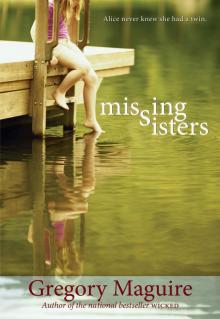 Missing Sisters
Missing Sisters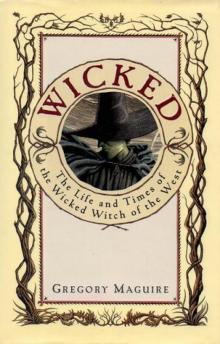 Wicked: The Life and Times of the Wicked Witch of the West
Wicked: The Life and Times of the Wicked Witch of the West After Alice
After Alice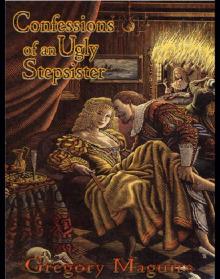 Confessions of an Ugly Stepsister
Confessions of an Ugly Stepsister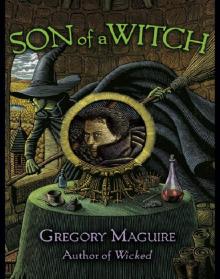 Son of a Witch
Son of a Witch Matchless
Matchless The Next Queen of Heaven
The Next Queen of Heaven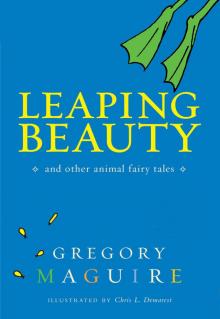 Leaping Beauty: And Other Animal Fairy Tales
Leaping Beauty: And Other Animal Fairy Tales Hiddensee: A Tale of the Once and Future Nutcracker
Hiddensee: A Tale of the Once and Future Nutcracker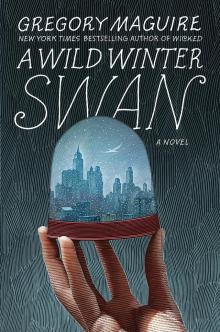 A Wild Winter Swan
A Wild Winter Swan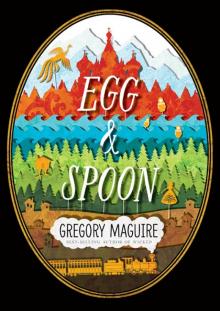 Egg & Spoon
Egg & Spoon Out of Oz
Out of Oz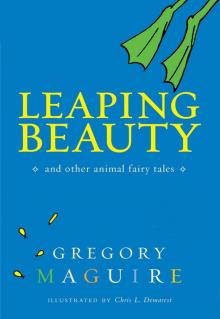 Leaping Beauty
Leaping Beauty Hiddensee
Hiddensee The Wicked Years Complete Collection
The Wicked Years Complete Collection The Next Queen of Heaven: A Novel
The Next Queen of Heaven: A Novel